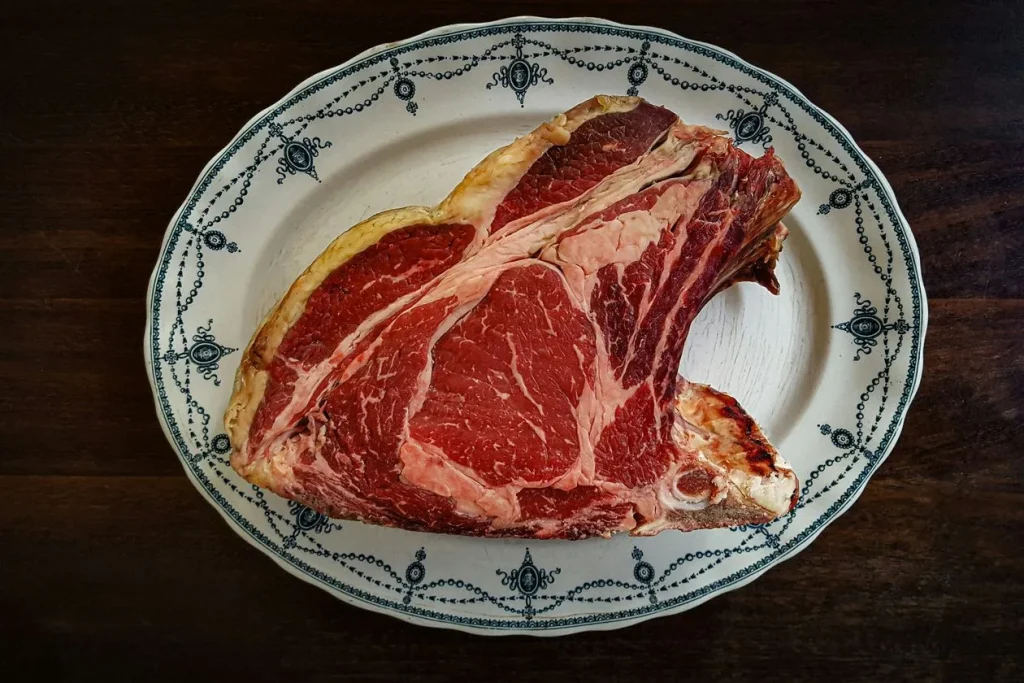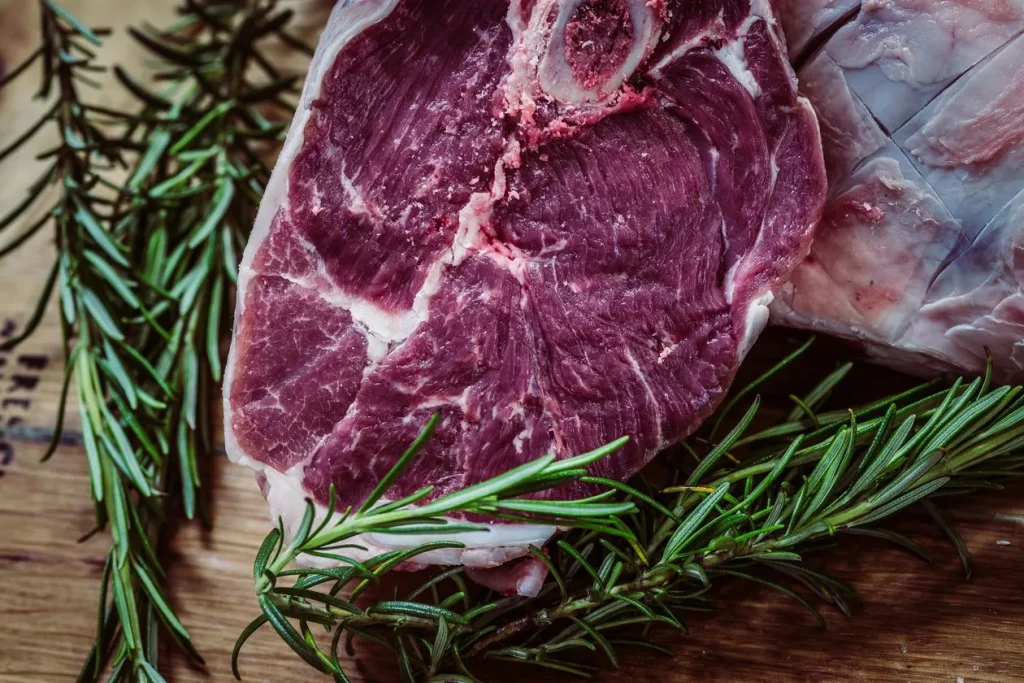Last updated on June 14th, 2025 at 01:43 pm
The carnivore diet has been gaining traction among those looking for a simple way to eat. But as with any diet, questions arise about its effectiveness and the role of calories. Many wonder: do calories matter on carnivore diet? This article digs into the relationship between calorie intake and the carnivore diet, sorting through the myths and realities to help you understand how it all works.
► Table of Contents
Key Takeaways
- The carnivore diet focuses solely on animal products, eliminating all plant foods.
- Caloric intake still plays a role in weight management, even on a meat-only diet.
- Many myths exist about calories leading to metabolic damage; understanding these can clarify your approach.
- Listening to your body’s hunger cues can help you adjust your eating patterns effectively.
- Comparing the carnivore diet to other diets reveals different caloric considerations and their impacts.
Understanding The Carnivore Diet

What Is The Carnivore Diet?
The carnivore diet, at its core, is an elimination diet that focuses almost exclusively on animal products. This means meat, fish, eggs, and some dairy are in, while everything else – fruits, vegetables, grains, legumes, nuts, and seeds – is out. It’s a pretty restrictive approach to eating, and people usually try it for various reasons, often related to health issues or weight management. The carnivore diet weight loss is a common goal for many.
Key Principles of The Diet
When you’re thinking about starting a carnivore diet, there are a few key things to keep in mind:
- Animal Products Only: This is the big one. Your plate should be filled with meat, fish, eggs, and maybe some animal fats. Think steak, chicken, salmon, and bacon.
- No Plant-Based Foods: Seriously, none. No sneaky salads or hidden veggies. This includes fruits, vegetables, grains, legumes, nuts, and seeds.
- Focus on Fatty Cuts of Meat: Fat is your friend on this diet. It helps you feel full and provides energy. Choose ribeye over sirloin, for example.
- Water is Your Best Friend: Stay hydrated. You’ll be losing water differently on this diet, so drink up.
The carnivore diet is not just about eating meat; it’s about understanding how your body responds to a diet devoid of plant matter. It’s an experiment in listening to your body and adjusting as needed.
Potential Benefits of Carnivore Eating
Some people report experiencing several benefits of carnivore eating when following a carnivore diet. These can include:
- Weight Loss: Many find it easier to lose weight due to the high protein and fat content, which can increase satiety.
- Improved Digestion: Some individuals with digestive issues report relief as they eliminate many common irritants found in plant-based foods.
- Reduced Inflammation: Some believe that cutting out plant-based foods can reduce inflammation in the body.
It’s important to note that these are anecdotal experiences, and more research is needed to fully understand the long-term effects of the carnivore diet. Always consult with a healthcare professional before making significant dietary changes. The benefits of a carnivore diet can vary greatly from person to person.
Recommended Articles
The Role Of Calories In Weight Management
Caloric Deficit Explained
Okay, so let’s talk about calories and weight. It’s pretty straightforward: to lose weight, you generally need to consume fewer calories than you burn. This is what we call a caloric deficit. Think of it like this: your body needs a certain amount of energy to function. If you give it less energy (calories) than it needs, it starts using stored energy (fat) to make up the difference. It’s not always perfect, but that’s the basic idea.
How Calories Affect Weight Loss
Calories are the fuel your body uses, and controlling them is key to weight loss. When you eat, your body breaks down food into energy. If you consistently eat more calories than you use, the extra energy gets stored as fat. On the flip side, if you eat fewer calories, your body taps into those fat reserves.
It’s a balancing act. Factors like activity level, age, and genetics also play a role, but calories are a big piece of the puzzle. It’s also worth noting that not all calories are created equal. 100 calories of steak will affect your body differently than 100 calories of processed carbs.
The Importance of Energy Balance
Energy balance is all about the relationship between the calories you consume and the calories you expend. It’s not just about cutting calories drastically; it’s about finding a sustainable balance that works for you. Here are some things to keep in mind:
- Basal Metabolic Rate (BMR): This is the number of calories your body burns at rest. You need to eat at least this many calories to keep your body functioning properly.
- Activity Level: The more active you are, the more calories you burn. This means you can eat more and still maintain a healthy weight.
- Thermic Effect of Food (TEF): Your body burns calories digesting food. Protein has a higher TEF than carbs or fats, meaning you burn more calories digesting it.
Finding the right energy balance is a personal thing. It takes some experimentation to figure out what works best for your body and your goals. Don’t be afraid to adjust your intake and activity levels as needed.
Myths Surrounding Calories On a Carnivore Diet
Common Misconceptions
When you start a carnivore diet, you’ll hear all sorts of things about calories. Some people say they don’t matter at all, while others insist you still need to track them. Let’s clear up some of the confusion. One common idea is that because you’re eating only meat, your body will magically regulate itself, and weight loss will happen without any effort. This isn’t always true.
While the carnivore diet can be effective for weight loss, ignoring calories completely might stall your progress. Another misconception is that you can eat unlimited amounts of meat without gaining weight. While it’s harder to overeat on a meat-based diet due to the satiety from protein and fat, it’s still possible to consume more calories than you burn.
The Myth of Metabolic Damage
You might have heard about “metabolic damage,” the idea that severely restricting calories can ruin your metabolism, making it harder to lose weight in the future. On a carnivore diet, this is less of a concern than on very low-calorie diets that include carbs.
The high protein intake helps preserve muscle mass, which is crucial for maintaining a healthy metabolism. However, consistently undereating, even on a carnivore, can still lead to some metabolic adaptation. Your body might become more efficient at using calories, which means you’ll burn fewer calories at rest. It’s more about long-term, extreme restriction than the diet itself.
Understanding Satiety and Hunger
The carnivore diet is known for its satiety. Protein and fat are incredibly filling, which can naturally reduce your caloric intake on a meat diet. You’ll likely find yourself eating less without even trying. However, satiety isn’t a foolproof system. Factors like stress, sleep, and even the types of meat you eat can influence your hunger levels.
For example, processed meats might not be as satiating as whole cuts of steak. It’s important to pay attention to your body’s signals, but also be aware that your perception of hunger can be affected by more than just your stomach. Here are some things to consider:
- Listen to your body’s cues.
- Prioritize whole, unprocessed meats.
- Ensure adequate sleep and manage stress.
It’s easy to assume that because you feel full, you’re automatically in a calorie deficit. But that’s not always the case. It’s still possible to overeat, even on the most satiating foods. Being mindful of portion sizes and how you feel after meals can help you stay on track with your goals for weight loss on a carnivore diet.
Here’s a simple table to illustrate how different meats can vary in calories:
| Meat Type | Calories per 100g | Protein (g) | Fat (g) |
| Lean Ground Beef | 150 | 26 | 5 |
| Ribeye Steak | 291 | 24 | 21 |
| Bacon | 541 | 39 | 37 |
This shows that even within a meat-based diet, choices matter when considering meat-based diet calories and caloric intake for meat-based diets. So, is calorie counting necessary on a carnivore? Not necessarily for everyone, but awareness is key. If you’re not seeing the results you expect, a closer look at your caloric intake on keto or carnivore might be needed. And remember, does meat help with weight gain? It can, if you eat too much of it!
Related article: Carnivore Diet: Benefits, Risks, Meal Plan and Food List
Nutritional Composition Of Carnivore Foods
Macronutrient Breakdown
When you’re diving into the carnivore diet, understanding the macronutrient profile of your food is key. It’s all about protein and fat, primarily from animal sources. The balance between these two can significantly impact how you feel and perform.
You’ll find that different cuts of meat offer varying ratios, allowing you to tailor your intake to your specific needs. For example, leaner meats will be higher in protein relative to fat, while fattier cuts like ribeye will provide a larger proportion of fat. This flexibility is one of the benefits of focusing on the nutritional value of animal foods.
Protein vs. Fat Ratios
On the carnivore diet, protein and fat aren’t just macronutrients; they’re your primary energy sources. Here’s a quick rundown:
- Protein: Essential for muscle building, repair, and various bodily functions. Aim for a moderate intake to avoid overstressing your kidneys.
- Fat: Your main fuel source. Don’t shy away from it! It helps with hormone production, satiety, and overall energy levels.
- Carbohydrates: Essentially zero on a strict carnivore diet. Your body adapts to using fat for energy through ketogenesis.
Finding the right balance is crucial. Some people thrive on higher protein, while others do better with more fat. Experiment to see what works best for you. The nutritional value of carnivore foods is in their simplicity.
Micronutrients in Animal Products
One of the biggest surprises for many new to the carnivore diet is the wealth of micronutrients available in animal products. It’s not just about protein and fat; you’re also getting a good dose of essential vitamins and minerals.
- Vitamin B12: Crucial for nerve function and red blood cell production; abundant in meat, especially liver.
- Iron: Heme iron, found in animal products, is more easily absorbed than non-heme iron from plants.
- Zinc: Important for immune function and cell growth; found in high concentrations in red meat.
- Omega-3 Fatty Acids: Especially prevalent in fatty fish like salmon; important for brain health and reducing inflammation.
While the carnivore diet can provide many essential nutrients, it’s important to be mindful of potential deficiencies. Organ meats, like liver and kidney, are nutritional powerhouses and should be included for a more complete nutrient profile. Consider supplementing if you have concerns, but prioritize whole animal foods first. The nutritional value of meat is often underestimated.
Listening To Your Body’s Signals
Hunger Cues on Carnivore Diet
On the carnivore diet, hunger cues can become remarkably clear. Because you’re eliminating processed foods and plant-based items, your body starts communicating its needs more directly.
You might find that your hunger signals are less frequent but more intense, signaling a true need for nourishment rather than a craving. Pay attention to these signals. Are you experiencing stomach pangs, or is it more of a general feeling of low energy? These nuances can guide your eating habits.
Intuitive Eating Principles
Intuitive eating isn’t just for plant-based diets; it can be adapted to carnivores, too. The core principle is to eat when you’re hungry and stop when you’re satisfied, without strict calorie counting or meal timing. This approach requires you to be present and mindful during meals, noticing how different amounts of meat affect your energy levels and overall well-being. It’s about building a trusting relationship with your body.
Adjusting Caloric Intake Based on Activity
Your caloric needs will vary depending on your activity level. If you’re highly active, you’ll naturally require more calories than someone who is sedentary. Here’s how to adjust:
- Listen to your body: Increase your portions if you consistently feel hungry or fatigued.
- Monitor your energy levels: If you’re feeling sluggish, you might not be eating enough to fuel your activities.
- Adjust gradually: Make small changes to your intake and observe how your body responds.
It’s important to remember that the carnivore diet, while restrictive, should still support your lifestyle. Don’t be afraid to experiment with portion sizes and meal frequency to find what works best for you. The goal is to feel energized and satisfied, not deprived.
It’s also worth noting that some people find it helpful to track their intake initially, not to restrict, but to gain a better understanding of their natural caloric consumption on the diet. This tracking intake can effectively provide valuable data points as you transition to a more intuitive approach. Also, remember that the carnivore diet and gut health are linked.
Related article: 10 Side Effects of The Carnivore Diet and How to Manage Them
Comparing the Carnivore Diet To Other Diets

Carnivore vs. Keto
When you look at the carnivore and keto diets, you’ll notice some overlap, but also key differences. Keto focuses on drastically reducing carbs and increasing fats, but it still allows for some plant-based foods. The carnivore diet, on the other hand, eliminates all plant foods, focusing solely on animal products. Both diets aim to shift your body into ketosis, where it burns fat for fuel. However, the carnivore diet is far more restrictive.
Carnivore vs. Paleo
The paleo diet is often seen as a more flexible approach to eating compared to the carnivore diet. Paleo emphasizes whole, unprocessed foods that our hunter-gatherer ancestors might have eaten. This includes meat, fish, fruits, vegetables, nuts, and seeds.
The carnivore diet is essentially a subset of paleo, but it cuts out all plant-based foods allowed on paleo. The main difference is the inclusion of plants in the paleo diet, which are completely off-limits on the carnivore diet.
Caloric Considerations Across Diets
When comparing these diets, it’s important to think about calories. While the carnivore diet might lead to automatic calorie restriction due to its limited food choices and the satiating effect of protein, calories still matter. The same is true for keto and paleo.
You can gain weight on any of these diets if you consistently eat more calories than you burn. However, the benefits of high-protein diets can help with satiety, potentially making it easier to manage your caloric intake. Here are some things to consider:
- Carnivore: Naturally high in protein and fat, which can help you feel full and reduce overall calorie intake.
- Keto: Requires careful monitoring of macronutrient ratios to maintain ketosis, but can also be high in protein and fat.
- Paleo: Offers a wider variety of foods, making it easier to overeat if you’re not mindful of portion sizes.
It’s worth noting that while some people find the carnivore diet simplifies their eating and helps them lose weight without counting calories, others may still need to pay attention to their intake to achieve their goals. The “high protein diet effects” can be significant, but individual results vary. Ultimately, understanding your body’s needs and adjusting your diet accordingly is key.
Practical Tips For Managing Calories

Tracking Intake Effectively
Okay, so you’re on the carnivore diet and thinking about calories. You might be wondering how to even begin tracking them. It’s not as straightforward as scanning barcodes on processed foods, right? Well, start with the basics. Get yourself a food scale and a reliable calorie-tracking app. Weigh your portions before you cook them. This gives you a more accurate idea of what you’re actually consuming.
- Focus on consistency over perfection. Don’t stress if you’re off by a few calories here and there. The goal is to get a general sense of your intake.
- Use the same app consistently. Switching between apps can lead to discrepancies in calorie counts.
- Pay attention to hidden calories. Things like cooking oils and butter can add up quickly.
It’s easy to get caught up in the numbers, but remember that tracking is just a tool. It’s meant to provide insights, not to become an obsession. Use it to learn about your eating habits and make informed choices.
Meal Planning on Carnivore
Planning your meals is a game-changer, no matter what diet you’re on. But on carnivore, it can feel a bit… repetitive? Not necessarily! Think about varying your protein sources. Beef, chicken, fish, pork – they all have slightly different nutritional profiles.
- Dedicate some time each week to planning your meals. This could be as simple as writing down what you’ll eat for each meal or prepping ingredients in advance.
- Consider batch cooking. Cook a large roast or a bunch of chicken thighs at the beginning of the week to save time.
- Don’t be afraid to experiment with different cuts of meat and cooking methods. This can help keep things interesting and prevent boredom. For example, cheese and heavy cream can help increase calorie intake.
Adjusting Portions for Goals
So, you’ve been tracking your intake and planning your meals. Now it’s time to fine-tune things based on your goals. Are you trying to lose weight, maintain your current weight, or gain muscle? Your caloric needs will vary depending on your activity level and metabolism.
- If you’re trying to lose weight, gradually reduce your portion sizes. Don’t make drastic cuts, as this can lead to feelings of deprivation and make it harder to stick to the diet.
- If you’re trying to gain muscle, increase your protein intake and add some healthy fats to your diet. Think about adding an extra serving of meat or some bone marrow to your meals.
- Pay attention to how your body responds to changes in your caloric intake. If you’re feeling tired or sluggish, you may need to adjust your intake accordingly.
If you’re struggling to find a reliable coach to guide you on your fitness journey, we can connect you with one. Just message us by clicking the button below and tell us your goals—whether it’s trying a specific diet, fasting, or a combination of both—so we can match you with your ideal lifelong coach.
Final Thoughts on Calories and the Carnivore Diet
In the end, whether calories count on a carnivore diet really depends on your goals and how your body reacts. Some folks might find they lose weight without counting calories, while others may need to keep an eye on their intake to see results. It’s clear that the carnivore diet can work for many, but it’s not a one-size-fits-all solution. Listening to your body and figuring out what works for you is key. So, if you’re thinking about trying this diet, remember to stay flexible and adjust as needed. Ultimately, it’s about finding a balance that fits your lifestyle and health needs.
Frequently Asked Questions
What is the Carnivore Diet?
The Carnivore Diet is a type of eating plan that includes only animal products, like meat, fish, and eggs. It avoids all plant foods.
Do I need to count calories on the Carnivore Diet?
Counting calories can help some people manage their weight, but many followers of the Carnivore Diet focus more on the types of food they eat rather than how many calories they consume.
Can I lose weight on the Carnivore Diet without tracking calories?
Yes, many people find they lose weight on the Carnivore Diet without counting calories, as the high protein and fat content can help control hunger.
Are there any health benefits to the Carnivore Diet?
Some people report benefits like weight loss, improved energy levels, and better digestion, but more research is needed to fully understand its effects.
What are the main nutrients in Carnivore foods?
Carnivore foods are rich in protein and fats, and they provide essential vitamins and minerals like vitamin B12, iron, and zinc.
How do I know if the Carnivore Diet is right for me?
It’s important to listen to your body and consult with a healthcare provider before starting any new diet, including the Carnivore Diet.
Related Articles
- Carnivore Diet: Benefits, Risks, Meal Plan and Food List
- 10 Side Effects of The Carnivore Diet and How to Manage Them
- Carnivore Diet Supplements
- 30-day Carnivore Diet Meal Plan PDF for Beginners
- Fasting on Carnivore Diet: What You Need to Know
- Can You Eat Pork Rinds on Carnivore Diet
- Best Magnesium Supplement for Carnivore Diet
- The Ultimate Diet Guide: Strategies for Effective Weight Loss
- What Seasonings Are Allowed on Carnivore Diet: Enhance Flavor Without Compromising Principles
- How to Lower Cholesterol on Carnivore Diet
- Fiber on Carnivore Diet: Do You Need It?
- Should You Take A Multivitamin on Carnivore Diet?
Syker Reid, the dynamic founder of Syktohealth, is a force in the health and fitness realm. Drawing on personal weight loss triumphs, he's committed to helping others achieve their health goals. With a degree in Exercise Science and Nutrition and a Certified Personal Trainer title under his belt, Reid's advice is both practical and science-backed.
Reid has grown Syktohealth into a trusted platform for weight loss, resonating with thousands seeking solid, achievable advice. His assertive yet approachable style, coupled with his professional knowledge and personal experience, makes him a credible guide for your weight loss journey. Under Reid's leadership, Syktohealth continues to empower individuals towards a healthier life.

